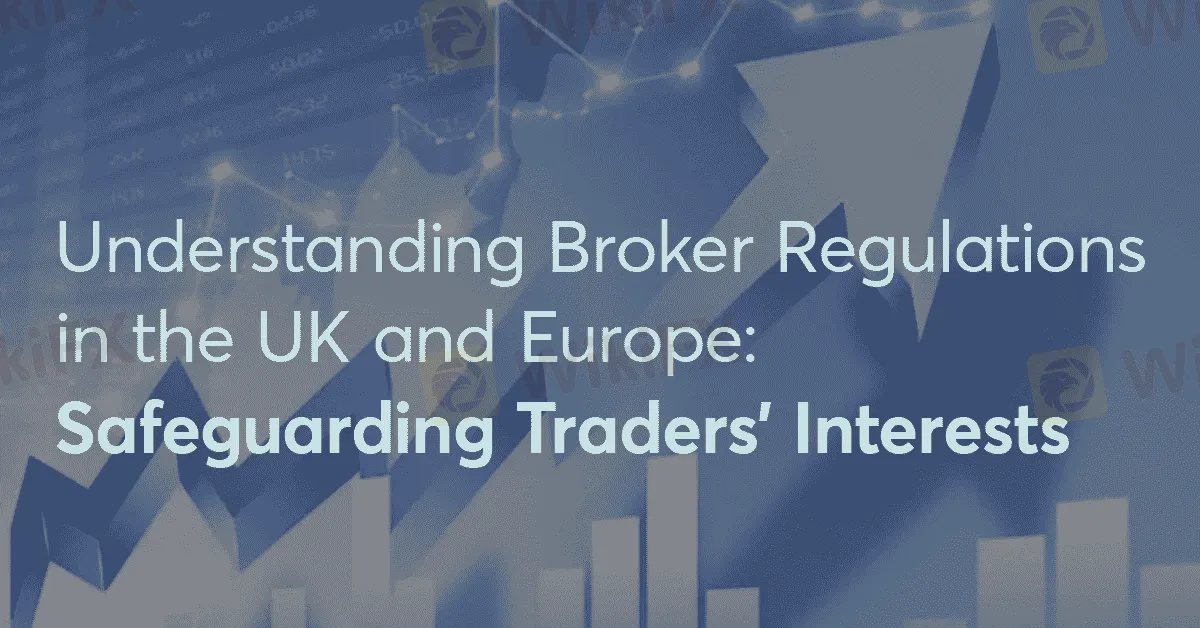简体中文
繁體中文
English
Pусский
日本語
ภาษาไทย
Tiếng Việt
Bahasa Indonesia
Español
हिन्दी
Filippiiniläinen
Français
Deutsch
Português
Türkçe
한국어
العربية
Understanding Broker Regulations in the UK and Europe: Safeguarding Traders' Interests
Abstract:In the dynamic world of Forex trading, regulatory frameworks serve as the bedrock of trust between traders and brokers. For traders in the UK and Europe, understanding the laws governing brokers is paramount. These regulations not only ensure ethical practices but also provide a sense of security, assuring traders that their investments are in safe hands. Here's a comprehensive overview of the laws around brokers in the UK and Europe.

In the dynamic world of Forex trading, regulatory frameworks serve as the bedrock of trust between traders and brokers. For traders in the UK and Europe, understanding the laws governing brokers is paramount. These regulations not only ensure ethical practices but also provide a sense of security, assuring traders that their investments are in safe hands. Here's a comprehensive overview of the laws around brokers in the UK and Europe.
United Kingdom (UK):
In the UK, Forex brokers are primarily regulated by the Financial Conduct Authority (FCA). The FCA is a renowned regulatory body known for its stringent standards and investor protection measures. Brokers operating in the UK must obtain FCA authorization, which involves rigorous scrutiny of their financial stability, operational integrity, and adherence to ethical practices.
One of the key aspects of FCA regulation is the Financial Services Compensation Scheme (FSCS). This scheme protects traders by compensating them up to £85,000 per person per institution if a regulated broker becomes insolvent. This safety net provides traders with a significant level of assurance, ensuring that even in adverse circumstances, their funds are protected.
Moreover, the FCA enforces strict rules regarding client fund segregation. Regulated brokers are required to keep clients' funds separate from their operational funds. This separation ensures that traders' money is not used for the broker's operational expenses, providing an additional layer of security.
European Union (EU):
In Europe, the regulatory landscape for Forex brokers underwent significant changes with the implementation of the Markets in Financial Instruments Directive (MiFID II). MiFID II is a comprehensive set of regulations designed to harmonize financial markets within the EU and enhance investor protection.
Under MiFID II, brokers must adhere to robust client protection measures, ensuring transparency and fairness in their dealings with traders. The directive mandates stringent risk disclosure requirements, ensuring that traders are fully aware of the risks associated with Forex trading before they engage with brokers. Brokers are obligated to provide detailed information about their services, fees, and potential conflicts of interest.
Additionally, MiFID II emphasizes best execution principles. This means that brokers must execute trades at the best possible terms for their clients, considering factors such as price, speed, likelihood of execution, and settlement size. These principles safeguard traders from unfair practices and price manipulations, fostering a level playing field in the market.
Post-Brexit Changes:
In the aftermath of Brexit, the UK established its own regulatory framework, maintaining its high standards of investor protection. Brokers operating in both the UK and Europe must navigate the complexities of dual regulations if they wish to provide services to traders in both regions. This duality underscores the importance of careful consideration and due diligence on the part of brokers and traders alike.
In conclusion, the laws around brokers in the UK and Europe are designed with the best interests of traders in mind. These regulations aim to create a transparent, secure, and fair trading environment. For traders, it is imperative to verify a broker's regulatory status before engaging in any trading activities. By choosing regulated brokers, traders not only protect their investments but also contribute to the overall integrity and stability of the Forex market, ensuring a safer trading experience for everyone involved.

Disclaimer:
The views in this article only represent the author's personal views, and do not constitute investment advice on this platform. This platform does not guarantee the accuracy, completeness and timeliness of the information in the article, and will not be liable for any loss caused by the use of or reliance on the information in the article.
Read more

Top 10 Trading Indicators Every Forex Trader Should Know
Master the top 10 Forex trading indicators to analyze real-time Forex quotes, trends, and market signals. Learn strategies to boost accuracy and avoid mistakes.

WikiEXPO Global Expert Interview: Simone Martin—— Exploring Financial Regulation Change
In the midst of financial innovation and regulation, WikiGlobal, the organizer of WikiEXPO, stays abreast of industry trends and conducts a series of insightful and distinctive interviews on pivotal topics. We are delighted to have the privilege of inviting Simone Martin for an in-depth conversation this time.

CySEC Settles Compliance Case with Fxview Operator Charlgate Ltd
Discover how CySEC resolved compliance issues with Charlgate Ltd, the operator of Fxview, through a €50,000 settlement. Explore the investigation, regulatory measures, and CySEC's new website designed for improved accessibility and transparency.

TradingView Launches Liquidity Analysis Tool DEX Screener
Discover TradingView's DEX Screener, a powerful tool for analyzing decentralized exchange trading pairs. Access metrics like liquidity, trading volume, and FDV to make smarter, data-driven trading decisions.
WikiFX Broker
Latest News
Geopolitical Events: What They Are & Their Impact?
Volkswagen agrees deal to avoid Germany plant closures
Top 10 Trading Indicators Every Forex Trader Should Know
WikiEXPO Global Expert Interview: Simone Martin—— Exploring Financial Regulation Change
TradingView Launches Liquidity Analysis Tool DEX Screener
MultiBank Group Wins Big at Traders Fair Hong Kong 2024
'Young investors make investment decisions impulsively to keep up with current trends' FCA Reveals
Why Do You Feel Scared During Trade Execution?
CySEC Settles Compliance Case with Fxview Operator Charlgate Ltd
Scope Markets Review: Trustworthy or Risky?
Currency Calculator


